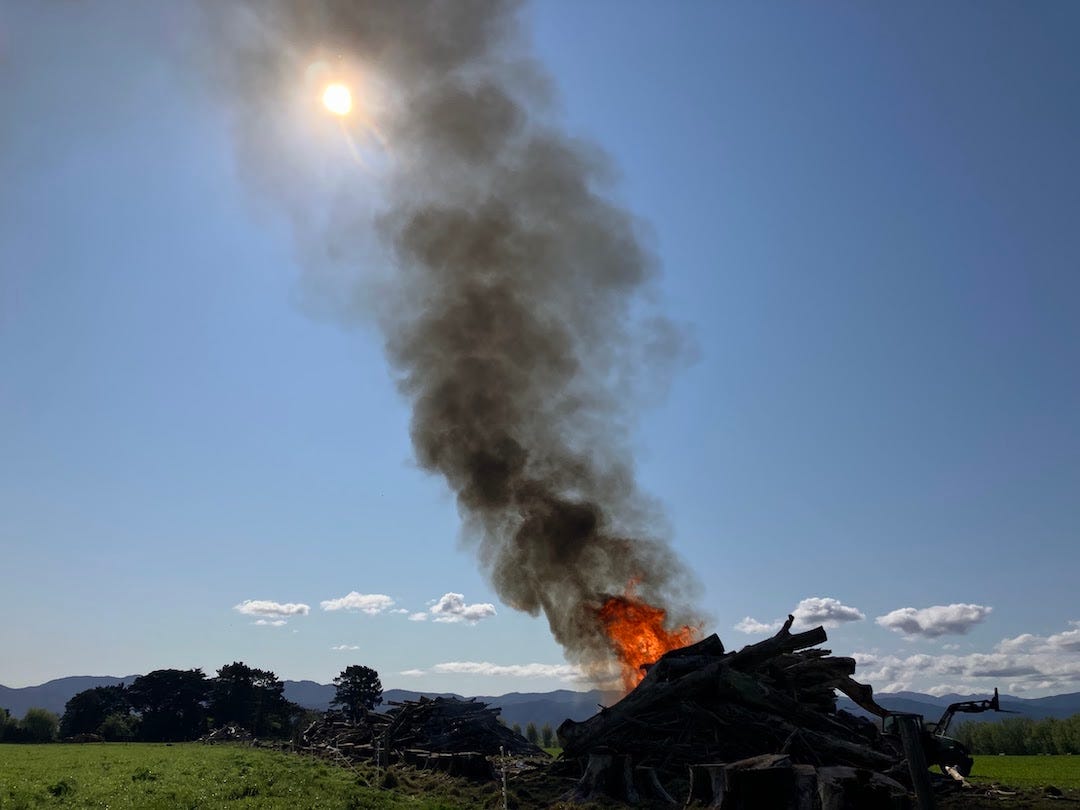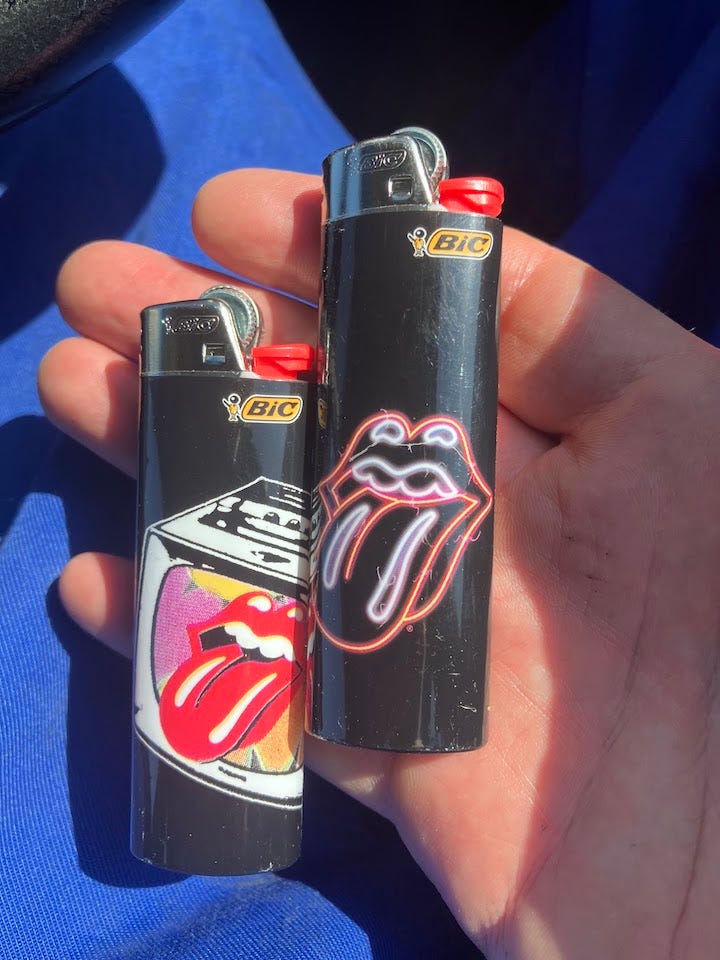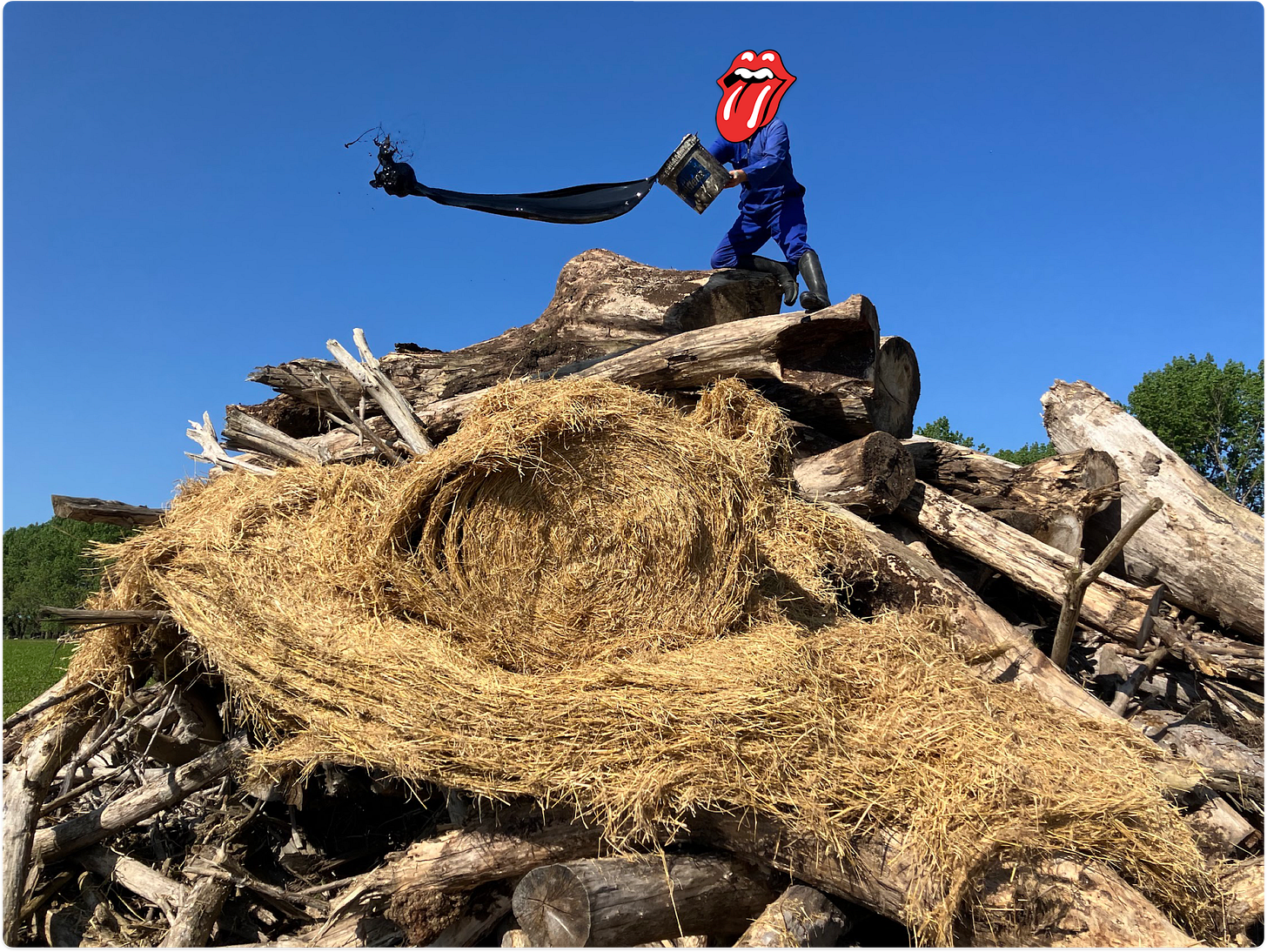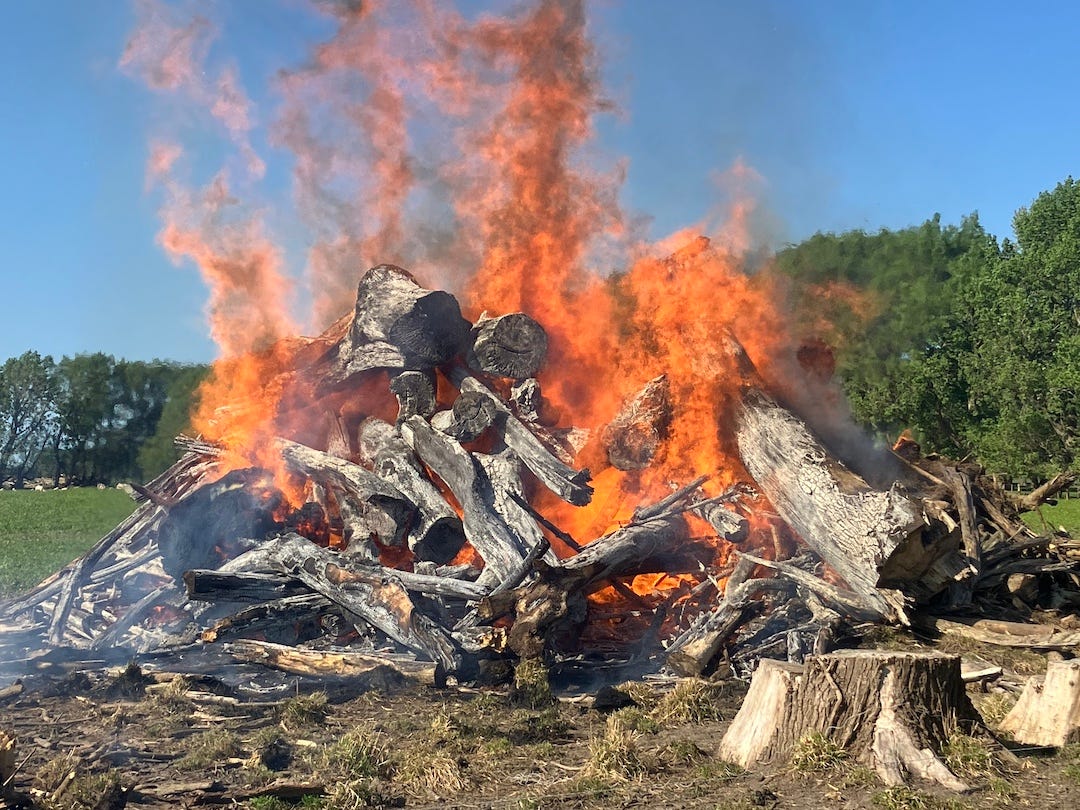I Just Came to Watch it Burn
Not a metaphor.
This week I played hooky to watch a bonfire. Not the NZ economy, not the Wellington job market. Actual flames.
A farmer friend of mine had cut down a windbreak of old, tangled poplars in his south paddock a couple years back, and now their remains had dried enough to put to light. A time for every purpose under heaven: it’s too early in spring for the planting rush to monopolize his days, and the ground’s still squelchy enough that the surrounding grass won’t catch. Me, I just like fire. These would be big, too, with heaps of logs and slash “about the size of this pub,” my friend said over a jug the other night. I have long tried, probably too hard, to live my life by the old children’s song: The bear went over the mountain / to see what he could see. So on Monday afternoon I shut my damn laptop, ate a sandwich, and drove out to see something burn.
First, the local context: New Zealanders cut down trees with an aplomb this American desert rat finds unnerving. In good ol’ Phoenix where I grew up the defacement of a single saguaro—not even a tree!—was headline news. But here trees, particularly the imported pines, poplars, maples, and oaks, are livestock to be managed, raw material more than souls. Some of this is abundance: trees here grow so fast you can watch. Some of this is safety: colonizer species have a weaker grip on the local mud, a distinct hazard in a country where forecasts routinely cite ‘severe gales in exposed places.’ But there is culture behind it, too. Tall Poppy Syndrome is real, and beneath it a Kiwi pragmatism so buttoned-up it’s almost zen. Let no one grizzled poplar get above its raising. We are all firewood in the end.
And anyhow these weren’t my trees, or my land, or my country. When in Rome, mate. I pulled my hatchback into the farmyard and my friend tossed me a set of bitchin’ blue coveralls to match his own. We had a can of diesel and a heap of used tractor oil but not a single match. No lighters in our pockets, either, responsible grown-ass dads that we are. We had to drive into Featherston and hit the grocery store, where they keep ‘em hidden behind the counter. Such a menace to society, these plastic Bics stamped with the Rolling Stones lips-and-tongue. We climbed back in the truck. Time to rock n’ roll.
Back at the south paddock my friend used his tractor to smash a bale of straw against the first mountain of dead logs—that’s the kindling. Then he clambered to the top and sloshed the whole mess with the motor oil, syrup-thick and black as death. Next came the diesel, which in an open bucket turns out to be a weak highlighter green. Then he lit a rolled-up page of the Wairarapa Times-Age and stepped to the pyre with a grin.
“Got any evidence you want to destroy?”
I should’ve planned ahead. An old novel draft, at bare minimum. My friend needed to clear a paddock, but I never dreamed the fire could have a purpose for me. I just came to watch it burn.
At the first flicker, sheep in the next pasture trotted away without looking back. The straw bale sighed and slumped eagerly into the flames. There was a ghostly whoosh, heavy with big-fire bass. Then a pillar of black smoke leapt over our heads and blocked out the sun.
Under its shadow, an ancient caveman alarm pinged in my chest.
“Wind’s shifted,” my friend said. “Maybe move the truck.”
I moved the truck.
The breeze settled. The adrenaline passed, and in its wake New Zealand seemed sharper, clearer, and even more green. We moved to the next pile. The rock station on the tractor’s radio played Sympathy for the Devil. Now it was my turn with the newspaper torch. For a second I watched the straw crackle and thought, with great satisfaction, I did that. But then the flames found the diesel and this great alien thing rose before me, wild and inhuman and utterly beyond my claim.
We stood awhile and watched the fires fatten and grow. A young possum dashed out of one pile, confused but unscathed, and bounded away. Clumps of charred straw rode the updraft like blackened birds’ nests on the wing. Deep in the first pile the former poplars were now cathedrals of neon fire. The heat on my face was crazy, even ten yards off. There were three more piles to go, but I had to pick up my kids.
And that’s pretty much it. My friend went back the next day to restack each pile with a tractor, just as you’d do at home with fireplace tongs. Barring a heavy downpour the pyres will burn two weeks or more, until the piles are flat to the earth. But this is not a story, really. On cozy winter nights I’m the guy who always says a cheerful fire in the hearth is better than TV. But you don’t stare into the flames for a plot. You just stare. To see what you can see.
They’ve got fires in America, too. Nobody in the dry half west of the Mississippi would dare leave ‘em burning alone for a second, much less a fortnight. But fire is as basic and universal and non-nationalized a phenomenon as you can find. Might as well write a New Zealand blog about water, earth, and air. Might as well, y’know, stay home. That children’s song ends with what the homebodies must have considered a warning: And all that he could see / and all that he could see / was the other side of the mountain…
But I dunno, man. Sounds worth a look to me.







Had dinner with Drew and Whitney last night in Taos, and was describing for them the slash-topped, crewcut hedgerows in the Wairarapa. So this column comes at the perfect time. Good job—I could smell the flames.
In his collection of short stories 'Orphans', Charles D'Ambrosio published an essay titled "Seattle, 1974" . Its a beautiful little piece about Seattle before Microsoft, Amazon, Starbucks, Expedia etc. made it the Shining City on the Hill. D'Ambrisio describes in vivid detail standing near a burning building during a driving rainstorm at night. He stood transfixed by the raw energy of the conflagration which was not dimmed in the least by the rain. I cannot recomend this essay highly enough.